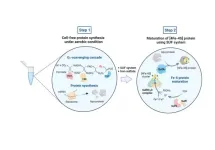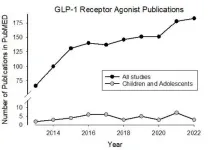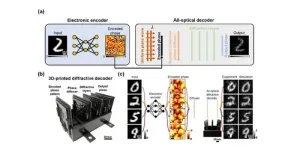(Press-News.org) Reaching the age of 90, 95 or 100, known as exceptional longevity, was more likely for women who maintained their body weight after age 60, according to a multi-institutional study led by University of California San Diego. Older women who sustained a stable weight were 1.2 to 2 times more likely to achieve longevity compared to those who experience a weigh loss of 5 percent or more.
Reporting in the Aug. 29, 2023 online issue of the Journal of Gerontology: Medical Sciences, researchers investigated the associations of weight changes later in life with exceptional longevity among 54,437 women who enrolled in the Women’s Health Initiative, a prospective study investigating causes of chronic diseases among postmenopausal women. Throughout the follow up period, 30,647, or 56 percent of the participants, survived to the age of 90 or beyond.
Women who lost at least 5 percent weight were less likely to achieve longevity compared to those who achieved stable weight. For example, women who unintentionally lost weight were 51 percent less likely to survive to the age of 90. However, gaining 5 percent or more weight, compared to stable weight, was not associated with exceptional longevity.
“It is very common for older women in the United States to experience overweight or obesity with a body mass index range of 25 to 35. Our findings support stable weight as a goal for longevity in older women,” said first author Aladdin H. Shadyab, Ph.D., M.P.H., associate professor at the Herbert Wertheim School of Public Health and Human Longevity Science at UC San Diego.
“If aging women find themselves losing weight when they are not trying to lose weight, this could be a warning sign of ill health and a predictor of decreased longevity.”
The findings suggest that general recommendations for weight loss in older women may not help them live longer. Nevertheless, the authors caution that women should heed medical advice if moderate weight loss is recommended to improve their health or quality of life.
The data expands on the growing research linking the relationship between weight change and mortality. Notably, this is the first large study to examine weight change later in life and its relation to exceptional longevity.
Co-authors include: Matthew A. Allison and Andrea Z. LaCroix, UC San Diego; JoAnn E. Manson, Brigham and Women’s Hospital and Harvard Medical School and Harvard T.H. Chan School of Public Health; Deepika Laddu, University of Illinois Chicago; Sylvia Wassertheil-Smoller, Albert Einstein College of Medicine; Linda Van Horn, Northwestern University Feinberg School of Medicine; Robert A. Wild, University of Oklahoma Health Sciences Center; Hailey R. Banack, Dalla Lana School of Public Health; Fred K. Tabung, Ohio State University; Bernhard Haring, University of Wurzburg and Albert Einstein College of Medicine; Yangbo Sun, University of Tennessee Health Science Center; Erin S. LeBlanc, Kaiser Permanente; Jean Wactawski-Wende, University at Buffalo – SUNY; Meryl S. LeBoff, Harvard Medical School; Michelle J. Naughton, Ohio State University; Juhua Luo, Indiana University Bloomington; Peter F. Schnatz, Reading Hospital/Tower Health; Ginny Natale, Stony Brook University; and Robert J. Ostfeld, Montefiore Health System.
This research was funded, in part, by the National Institutes of Health, National Heart, Lung, and Blood Institute, and U.S. Department of Health and Human Services (75N92021D00001, 75N92021D00002, 75N92021D00003, 75N92021D00004 and 75N92021D00005).
Disclosure: Robert J. Ostfeld, MD, MSc, declares research grants from Purjes Foundation and Greenbaum Foundation, and is an advisory board member of Mesuron, Inc. with stock option interest.
DOI: 10.1093/gerona/glad177
END
Maintaining stable weight increases longevity among older women
2023-08-29
ELSE PRESS RELEASES FROM THIS DATE:
Air pollution and its threat to health are unequally spread throughout the world, and so are the opportunities to combat it
2023-08-29
As global pollution edged upward in 2021, so did its burden on human health, according to new data from the Air Quality Life Index (AQLI). If the world were to permanently reduce fine particulate pollution (PM2.5) to meet the World Health Organization’s (WHO) guideline, the average person would add 2.3 years onto their life expectancy—or a combined 17.8 billion life-years saved worldwide.
This data makes clear that particulate pollution remains the world’s greatest external risk to human health, with the impact on life expectancy comparable to that of smoking, more than 3 times that of alcohol use and unsafe water, and more than ...
Overcoming the challenges to synthesising iron–sulfur proteins outside the glovebox
2023-08-29
Fe–S clusters, which are a part of Fe–S proteins, are found across all forms of life. They play a significant role as biological cofactors—helper molecules that assist these proteins in different biochemical transformations—that are involved in respiration and metabolism. These clusters are of keen research interest since they are considered to be a critical part of evolution. They serve as a link between pre-biotic chemistry (chemical processes that existed prior to the emergence of life forms) and the complex molecular and biological systems we know today. Put simply, they ...
Mothers in prison embrace a parenting program to strengthen bonds with separated children
2023-08-29
The number of women imprisoned in Australia has jumped by 64% in the past decade, leaving thousands of children separated from their mothers and causing huge stress to both parties.
In a bid to ease the strain of separation and maintain the mother-child bond, a new prison parenting program has been developed in close collaboration with women in prison as well as prison staff and key members of the Aboriginal community in South Australia.
The Mothers Matter program, led by University of South Australia midwife and researcher Belinda Lovell, includes direct input from Aboriginal and/or Torres ...
Resistant E. coli rises despite drop in ciprofloxacin use
2023-08-29
After a nearly threefold drop in prescriptions for the antibiotic ciprofloxacin between 2015 and 2021, the rates of ciprofloxacin-resistant E. coli bacteria circulating in the community did not decline.
In fact, a study of Seattle-area women over age 50 who had not taken any antibiotics for at least a year discovered that the incidence of gut-colonizing ciprofloxacin-resistant E. coli actually increased. About 1 in 5 women in the study were affected.
Scientists at the University of Washington School of Medicine, Kaiser Permanente Washington Health Research Institute and Seattle Children’s Hospital ...
Golden rules for building atomic blocks
2023-08-29
National University of Singapore (NUS) physicists have developed a technique to precisely control the alignment of supermoiré lattices by using a set of golden rules, paving the way for the advancement of next generation moiré quantum matter.
Moiré patterns are formed when two identical periodic structures are overlaid with a relative twist angle between them or two different periodic structures but overlaid with or without twist angle. The twist angle is the angle between the crystallographic orientations of the two structures. For example, when graphene and hexagonal boron nitride (hBN) which are layered materials are overlaid on each other, the atoms in the ...
Researchers at UC Irvine issue a warning that GLP-1RA’s may be dangerous for children
2023-08-29
A team of clinicians, exercise scientists, pharmaceutical scholars, ethicists and behavioral experts at the University of California, Irvine, outlined their concerns that the use of glucagon-like peptide-1 receptor agonists (GLP-1RAs) to treat childhood obesity and type 2 diabetes may have unintended and adverse consequences for children’s health.
The commentary, Unintended Consequences of Glucagon-like Peptide-1 Receptor Agonists Medication in Children and Adolescents – A Call to Action, was published as a perspective in the Journal of Clinical and Translational Science. The article was led by Dan M. Cooper, MD, distinguished professor in the Department of Pediatrics ...
Medicine: Mozart lullaby may relive pain in newborns during blood spot test
2023-08-29
Playing a Mozart lullaby may help reduce the pain experienced by newborn babies undergoing a heel prick blood test, according to a randomised, blinded clinical trial involving 100 infants published in Pediatric Research.
Saminathan Anbalagan and colleagues measured the pain levels of newborn infants undergoing a heel prick blood test as part of routine screening for conditions such as jaundice and phenylketonuria (PKU) in New York City, New York, USA between April 2019 and February 2020. Infants were, on average, two days old and born at 39 gestational weeks, while 53% were male and 61% were Hispanic. As part of standard care, all infants ...
Saving species from extinction - high-quality kākāpō population sequencing provides breakthrough in understanding key conservation genetics
2023-08-29
High-quality sequencing of nearly the entire kākāpō population, funded through a Genomics Aotearoa project, is helping New Zealand to manage the health of this critically endangered species.
Not only is it already making a difference to kākāpō survival, but establishing sequencing methods to work with populations under threat is also likely to be the foundation for the future of endangered wildlife science in New Zealand and the rest of the world.
The state-of-the-art methods developed by Dr. Joseph Guhlin ...
High-fidelity transmission of information via novel electronic-optical system
2023-08-28
Transferring optical information in free space with large bandwidth and high transmission capacity has gained significant attention in various applications, such as remote sensing, underwater communication, and medical devices. Nevertheless, unpredictable, unknown phase perturbations or random diffusers within the optical path pose great challenges, limiting the high-fidelity transmission of optical data in free space. Adaptive optics presents a potential solution that can correct for random distortions ...
Two studies demonstrate the benefits and limitations of artificial intelligence in colonoscopy
2023-08-28
Embargoed for release until 5:00 p.m. ET on Monday 28 August 2023
Annals of Internal Medicine Tip Sheet
@Annalsofim
Below please find summaries of new articles that will be published in the next issue of Annals of Internal Medicine. The summaries are not intended to substitute for the full articles as a source of information. This information is under strict embargo and by taking it into possession, media representatives are committing to the terms of the embargo not only on their own behalf, but also on behalf of the ...








